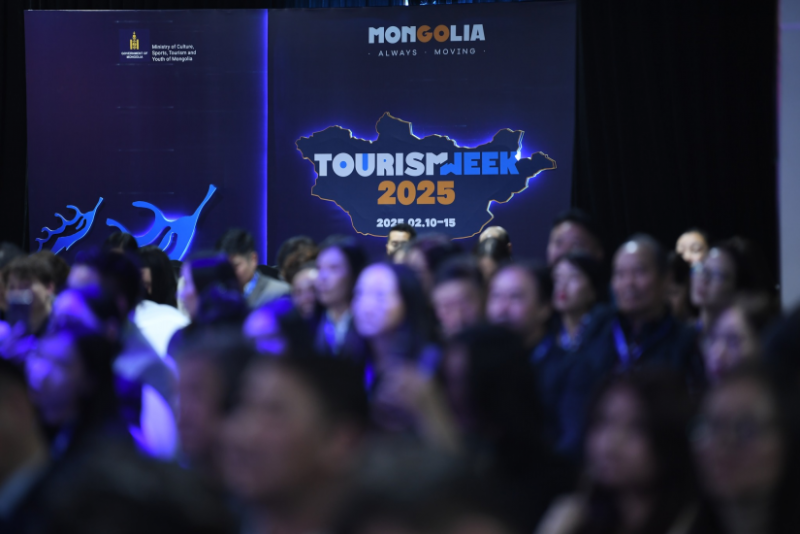B.BATTSETSEG: MONGOLIA'S REPUTATİON ON GLOBAL ARENA HAS NOTABLY IMPROVED
The following is the interview with Minister of Foreign Affairs of Mongolia B. Battsetseg.
This year our country’s foreign relation was very active and full of significant events. On the other hand, international relations and geopolitics have greatly changed and unstable situations have been continuing around the world. How do you see those circumstances?
-The global pandemic and ensuing geopolitical issues have been strengthening the significance of Mongolian peaceful, open, independent, and multi-pillared foreign policy. The essence of our foreign policy strategy resides in pursuing soft balancing. In 2022, we successfully hosted and reciprocated several high and highest-level visits, concluded numerous official documents, and expanded our relations and cooperation. Even though the world economy is slowing down due to worldwide electricity supply interruption, increase in inflation, tight monetary policy, and ensuing geopolitical uncertainty, we have successfully created the prerequisite condition to overcome the challenges of this trying time, as described by the Prime Minister L.Oyun-Erdene as an “unsettling time”, with minimum loss. Meanwhile, I would like to highlight two important aspects in our foreign relations practice. First of all, the latest happenings around the world showed us and validated that our foreign relations principles and foreign policy strategies had been right from the very beginning. Therefore, we must pursue our balanced and multi-pillar foreign policy in the future as well. Secondly, we are witnessing that the foreign and domestic policies of countries have been becoming notably equal.
For our ministry, we have started participating in issues not only on foreign relations but also on other issues facing our country since the pandemic. It is a comparatively new phenomenon for our practice. Thanks to the situational awareness of our government officials to changes and dynamics in international politics and the internal and external environment of our national security, we completed many projects in 2022 by targeting efforts of the Ministry of Foreign affairs for certain pragmatic goals with our current potential. We used to hold and reciprocate an average of 2-3 high-level visits annually for the last 30 years, but this year we have already paid over ten high and highest-level visits, including official visits of 6 ministers of foreign affairs from our neighboring and third neighboring countries. This year the UN Secretary-General also paid an official visit to Mongolia. These visits paved the way for many issues to be solved favorably in terms of relations and cooperation. According to local and foreign analysts and observers, Mongolian international reputation on the global arena has notably improved.
The official visit of the UN Secretary-General Antonio Guterres to Mongolia attracted international attention. Why did the UN Secretary-General Antonio Guterres visit Mongolia during this trying time?
-As I mentioned above, the essence of our foreign policy resides in pursuing soft balancing. We have to keep our relationship with our two neighbors and third neighbors balanced. The relations between our two neighbors must be balanced as well. This is one of the pillars of our national security. Another pillar is certainly multi-pillar cooperation.
We, Mongolia, must make our contribution to the collective efforts of the international community to maintain peace and stability in regions and the whole world and increase our participation continually. Concurring the 30th anniversary of Mongolia’s declaration of its territory as a nuclear-free zone and the 20th anniversary of Mongolia’s participation in the United Nations Peacekeeping operation, we invited UN Secretary-General Antonio Guterres and held discussions referring to expanding our cooperation with UN specialized agencies and the international organizations. It had great significance to the current situation of international politics. The UN Secretary-General’s description of our country as “a symbol of peace in a troubled word” is a kind of praise for our contribution to the UN’s activities and peacekeeping operations. It also highlighted the increasing importance of our nuclear-free status. During his visit, we profoundly discussed increasing the benefits of the UN projects and programs implemented in Mongolia. Further, we are planning to cooperate on increasing the benefits of the UN projects and programs and coordinating the UN’s “Sustainable Development Goals-2030” with priority directions of Mongolian development, especially, with the long-term development policies, “Sustainable Development 2030” and “Vision 2050”.
You said Mongolia’s international reputation had been improving. Could you elaborate on this?
In addition to the UN Secretary-General Antonio Guterres’s visit, other high-level officials visited our country in 2022, including the Under-Secretary-General for Peace Operations of the UN, the UNESCO Director-General, the Speaker Of The Senate of Canada, the Deputy Speaker of Riksdag (Swedish Parliament), Foreign Ministers from Russia, China, Poland, Japan, and Laos, The Minister Of Commerce of Thailand, Japanese Parliament delegations, the Defense Minister, the Deputy National Security Advisor and the Union Law and Justice Minister of India, the Chef of Defense of Germany and the Chairman of the Standing Committee of China's National People's Congress (NPC). They were all routine and planned visits, aimed at implementing our foreign policy and specific goals between two countries. In summary, besides validating our multi-pillar foreign policy, these visits demonstrated our dedication and consistency in maintaining the balance in our foreign relations, which I am describing as the “essence”.
This year, the foreign ministers of our two neighboring countries visited Mongolia consecutively, and it was also noteworthy the reciprocated high-level visits from our side. What about the results of these visits?
-Although strict pandemic restrictions in our southern neighbor continued and foreign visits were severely restricted, bilateral relations developed rapidly in 2022. With the latest visit of Mongolian President Ukhnaagiin Khurelsukh, bilateral cooperation in a wide range of areas is expected to be activated, especially trade ties between our two countries will be further strengthened and increased to USD 20 billion. They also discussed a wide range of issues such as increasing the export of mining products, stably exporting coal in long-term, diversifying the trade structure, expanding oil cooperation, and advancing the progress of development projects in the further.
Moreover, China’s side reaffirmed its support for the “One Billion Trees” national campaign, initiated by our President to contribute to the global effort in the fight against global warming and climate change, and agreed to implement joint projects. During the visit, the parties signed 16 bilateral cooperation documents and issued a joint statement with 19 clauses covering certain projects and programs of cooperation.
For our northern neighbor, when Minister Lavrov. B visited our country last fall, he highlighted the development of the Mongolia-Russian comprehensive strategic partnership and the parties confirmed their interest to strengthen mutual trust and cooperation. In developing balanced relationships with our two neighbors, we strive to further the three-pillar economic cooperation initiatives. The discussions are continuing and progresses are being made in the implementation of specific projects such as the construction of an economic corridor connecting the three countries, the laying of a gas pipeline through our country, the construction of east and west vertical railways, and the development of cross-country road transport.
What progresses have been made in our relations with the third-neighboring countries?
-As relations with two neighbors become active, relations with third neighbors should expand to the same extent. This year, President Ukhnaagiin Khurelsukh paid a state visit to Japan, and Prime Minister L. Oyun-Erdene visited Singapore and Germany. As for Japan, our president made a state visit after 12 years.
The visit to Japan was important in determining the prospect of the development of diplomatic relations with 50 years of history, between the two countries for another 50 years. In this context, a "Special Strategic Partnership for Peace and Prosperity" was announced and a joint statement was issued to consolidate bilateral relations. Moreover, we defined a goal to develop “human-centered” cooperation to empower human resources in all sectors in the further. The Japanese side also supported the "One Billion Trees" national campaign initiated by our president and discussed specific issues such as planting 50,000 trees and providing cognitive training to 20,000 children and youth in our country. They also exchanged diplomatic notes on the implementation of the "Project to Improve Mongolia's Energy Supply" with the help of a Japanese government grant.
Prime Minister L. Oyun-Erdene paid an official visit to Singapore to develop mutually beneficial cooperation, and learn from their knowledge-based development experiences in the Savings Fund, the governance of state-owned companies, urban planning, public housing programs, e-governance, and information technology-based civil service reforms. During his visit, the parties exchanged views on issues and signed three cooperation documents.
The Prime Minister also visited Germany and agreed to advance bilateral relations to the level of strategic partnership. During his visit, the parties agreed to start research work on establishing a copper processing plant and a semi-processing plant for rare earth elements, which are the main raw materials for electric cars, and to jointly implement a phased training program for 1,000 engineers in the priority sectors such as energy, transport, logistics, mining, information technology, urban planning, agriculture, and forestry.
Also, during the visit of South Korean Foreign Minister Park Jin to Mongolia, we decided to establish a joint research center for rare earth elements, and the center’s operation will be started soon.
How do you see the general outlook for foreign relations in 2023?
-Our political and administrative departments observe the development of the international political situation and the direction of relations and present annual and quarterly predictions about Mongolia's foreign political environment. In doing so, rather than predicting that this year and this season is expected to be like this or like that, we try to imagine the development in at least 2-3 scenarios. If the current crisis and conflicts in the international arena continue for a long time, of course, there will be difficulties in implementing our foreign policy goals. However, in any case, the balance of our foreign policy must be maintained. Diplomatic work becomes more valuable with its continuous, regular, and permanent nature. We must plan our activities and determine our future direction by regularly analyzing the meeting minutes, news, presentations, and report sheets of diplomatic missions abroad and their staff. Especially in the context of an unstable foreign political environment, increased international conflicts, and sanctions, it is the most important task to try to compensate for the inevitable limitations caused by these with analytical capabilities. Therefore, next year, we will focus more on strengthening the analytical capacity of the Ministry of Foreign Affairs. A few quality and significant visits will be planned based on the analysis. We are planning to take measures in the field of improving the skills of our diplomatic staff and improving the quality of our news and reports presented to the government.
As for the general outlook for the coming year, there is speculation that the conflicts and sanctions in countries will continue, and the tendency to circumvent the norms and rules established by multilateral institutions such as the World Trade Organization may become widespread. In such a situation, most countries will pursue a protectionist economic policy. It is also predicted that the war in Ukraine may drag on for another 2-3 years. In that case, there is a risk of an international economic crisis as the global energy shortage intensifies and the price of natural gas and oil increases.
In addition, the threat of epidemics has not completely disappeared, and it is unpredictable when and how new types of infections may suddenly spread. Therefore, in the future, our country must adhere to the primary principles of foreign policy, expand trade and economic cooperation, evenly expand Mongolia's diplomatic representation abroad, and pay special attention to further activating balanced cooperation with our two neighbors and third partner countries.


